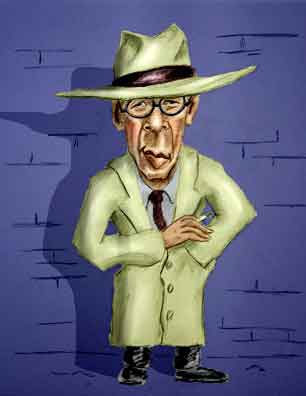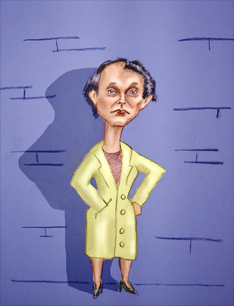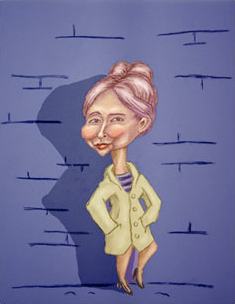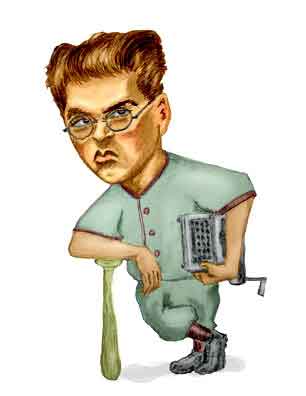Henry Miller:
The Happiest Man in the World and the Most Influential Writer Ever?
(Or Just a Second-Rate Pornographer with Delusions of Grandeur?)

Henry Miller
The Happiest Man (Ever) Alive?
Henry Miller is the type of author to whom history always seems on the verge of rendering its final verdict. So were his books the product of one of the greatest literary talents in history, or will they end up in the bargain bins of the dwindling numbers of bookstores with the new readers saying, "And for this I paid a quarter?"
What is certain is that if you leaf through one of Henry's books looking for - quote - "the good parts" - unquote - you'll find yourself asking what was the big deal. Certainly considering what you can read now just by a mouse click (at least, that's what CooperToons hears), what Henry wrote is pretty tame. Those with prurient tastes will probably end up skipping over page after page of Henry's philosophical meanderings that will strike them as rather quaint if not actually incomprehensible.
Henry was born in New York City in 1891 and never lost his Brooklyn twang even when speaking fluent French. Like writers of all times he worked at various jobs before finding literary immortality. In his first real job (he was nearly thirty), he became a surprisingly effective employee relations manager for Western Union. Henry took his duties quite seriously and realized there was a bit of a problem with the employment philosophy since the average tenure of the WU messenger was five days. But Henry wanted to write even though his mother kept telling him that his "scribblings" would never amount to anything.
Finally Henry realized if he wanted to write, then dang it, he had to write. With June, the second (and most famous) of his five wives, he moved to Paris. Lest people feel sorry for June being pulled from Brooklyn domesticity to the Bohemian life along the Seine, it was actually her idea for Henry to give up his job. June was every bit as wild and crazy as Henry, if not wilder and crazier. She would go off with her own friends (wink, wink) leaving the surprisingly neat and fastidious Henry fuming by himself. But in any case, they were now in Paris along with the many other American writers and artists of the World War I generation. Henry vowed, he said, never to take a real job again.
Although Henry did write some freelance articles for various US magazines and newspapers, mostly he lived by bumming off his friends. A friendly and gregarious man and an entertaining talker, Henry would set up a two week schedule where he made sure he'd get dinner and sleep at a friend's house for a day or so and move on to someone else. That way he never wore out his welcome and could find the time while his host was away to work on his books. Then of course, there was always the outlet for the not-really starving expatriate writer cranking out the paperback trash novels that American tourists liked to pick up and sneak back home. But Henry had some trouble even doing that since his editors complained they wanted trash, and Henry was giving them literature.

June Miller
Wilder Than Henry
Henry was certainly no child prodigy, and his first book Tropic of Cancer wasn't published until 1934 when he was 42. Then as now, to get a serious book published requires capital and the shoestring publishers couldn't borrow from the earnings of their non-existent bestsellers, particularly to finance an untried middle age writer. Still the publisher of Obelisk Press liked the book and this was, after all, the era of the artistic patron.
A patron sometimes was nothing more than some rich fat-cat that didn't want to give money to the starving and homeless, but could tone down a robber baron reputation by supporting the arts. In that sense they were the forerunners of the modern corporate art funding. Still others were people with honest appreciation of the arts (and some had considerable talent themselves) who came from well-to-do families or had found a calling that allowed them to make a good income with money to spare. But whatever the motive for their generosity, a patron of literature could 1) give the writer eating money while they wrote their books and 2) pay the publisher's costs once the book was done. In the early Twentieth Century probably the most famous patron in Paris was the American lawyer John Quinn, and it was John who helped support the now classic authors like Joseph Conrad, James Joyce, Y. B. Yeats, and Ezra Pound (whoever they were).
Unfortunately, John had died a decade before Henry went to France, but Henry found a well-to-do girlfriend - sorry, patron - in Anais Nin, the wife of banker Hugh Guiler. Both Anais and Hugh fit the criteria of highly artistic people themselves. Hugh later became a film maker, and in the 1970's Anais herself put out two best sellers of pretty explicit and steamy stuff. In any case, Henry met Anais, struck up a friendship, and it was her 5000 francs (then $160) that gave Obelisk the wherewithal to publish Tropic of Cancer.
Although Henry's books began appearing in Paris in the mid-1930's, they didn't see print in the United States for nearly thirty years. But the customs inspectors would often politely ignore the books when they found them packed in tourists' luggage, and so Henry ended up with a growing and loyal American following. He was particularly popular among the Beat Generation, and his writings had a heavy influence on authors like Jack Kerouac and Allen Ginsberg, two Emperors of American letters that some people nowadays see as rather scantily clad.

Anais Nin
Henry's - ah - "Patron"
As World War II loomed, Henry returned to the United States, and eventually settled in Big Sur where he found he could rent a small house for $15 a month. Still not financially independent, he nearly broke his vow when he applied for a job as a parole officer. But instead he wrote his friends asking them to send money so he could write. With that source of income, plus what he did earn from his books and from painting watercolors (which actually brought him a meaningful income), he settled down to a comfortable lifestyle as a full time writer.
Grove Press finally published Tropic of Cancer in the United States in 1961, and following three years of the inevitable court battles, the US Supreme Court finally agreed Henry wrote literature. So by the mid-sixties you could find Henry's books, Black Spring, Tropic of Cancer, Tropic of Capricorn, and his Rosy Crucifixion trilogy: Nexus, Sexus, and Plexus in America. You didn't have to go to avant-garde bookstores in the Big Apple and San Francisco, either. They were right there in your local supermarkets and five-and-dimes in middle and small town America. The late date that his books were printed in the US were all the more ironic since in 1957 Henry had been elected to the National Institute of Arts and Sciences.
But the real irony was the way Henry could be totally ignored by the very people you would expect to go after him with spittle-flinging diatribes. The Supreme Court ruling notwithstanding, in one of the most conservative (and some would say backward) states in the Union, the self-proclaimed Saviors of America started slobbering around their local bins for books to ban. Amazingly they ignored Henry altogether. In their scouring, one of them pointed to Henry's book Black Spring and asked if they should take it in for judgment. Another of the other panel members - a paragon of American virtue we must believe - said it wasn't so bad.
Contemporary opinion was always divided as to the merit of Henry's work. Perhaps his most illustrious reviewer was George Orwell, the author of Animal Farm and 1984. In 1940 George wrote a lengthy (and favorable) review of Tropic of Cancer and Black Spring. The review, "Inside the Whale", is considered one of George's best essays, and George later developed a cordial if somewhat shaky friendship with Henry.
Some critics agreed with George's favorable assessment, others didn't. "He writes literature, not pornography," one jacket-quoted critic trumpeted. But another critic dissented, "As a pornographer Miller has been surpassed," he wrote, adding, "As a critic of America, he is a gadfly with delusions of grandeur, an ineffectual rebel who can never make up his mind whether to stick out his tongue or take to the barricades." But then some critics themselves didn't make much sense, such as the one that said Henry's book Tropic of Capricorn "might have been written by Harpo Marx and Hieronymus Bosch working together." What the heck does that mean? But the quote was too good to pass up, and Henry's publishers added it to the Capricorn cover blurbs.
Like Orwell, Henry may really have been at his best as an essayist rather than a novelist. When seeing Henry in an interview it could be difficult for the viewer to get past Henry's Brooklyn patois which was oft time peppered with a vocabulary selected from the seven words you can't say on television. But you have to remember this was the same thoughtful and intelligent man who penned the classic "Defense of the Freedom to Read".
Today Henry has become so mainstream that it's de rigueur for many endowed professors (that is, professors with endowed chairs, not necessarily well-endowed professors) to hail him as a leading light of American Literature. Still others complain about his 21st Century political incorrectness. So when the critics of today do blast Henry they do so - to paraphrase some other hack writer - less for the matter than the manner of his writings. In the - again we use quotes - "good parts" - he often comes off as an entirely self-centered roué who looks on his muliebrious co-characters as objects provided merely for his own gratification. That was not, we hasten to add, an unusual masculine attitude in the 1930's, and one lady reviewer actually praised Henry for accurately representing men as the way they really are. On the other hand the number of times Henry uses the worlds "I", "me", "my", or "mine" in his more philosophical passages can get a bit tiring.
At least Henry's book are written with humor. In one of his more amusing stories, he told how one of the neighborhood ladies would come in tears to Henry's father, saying her husband had wandered off. So Henry's dad would go off with her to find the wayward spouse. Naturally the hunt would take at least a couple of hours. Then when the lady's husband died, Henry's dad suggested Henry should pay her a visit; perhaps Henry could console the new widow in her great grief. Henry did indeed.
Today virtually all of Henry's personal friends are dead and gone, and to what degree Henry's fictional characters fit with his real persona is something a decreasing number of people have much first hand knowledge of. Those who did know him were, as you might expect, divided in their opinions and reactions. Some (who usually knew him only briefly) found him rather strange, trim and fit but looking older than his years, and who would not hesitate to hit up marginal acquaintances for money. However others recalled a kindly and generous man who took a generally benevolent view of the world - a world, by the way, that he thought really wasn't worth taking a generally benevolent worldview of.
Whether Henry will continue to be simultaneously lionized as a pioneer of modern literature and damned as a hack writer who simply appeals to people who have no life, or whether he will end up as a forgotten author of crumbling, disintegrating volumes is a good question that happily won't be answered here. But for now the world's literati mostly holds him in high regard.

James T. Farrell
The Greatest Forgotten Writer in America"
At least Henry hasn't fallen victim to the fate of his literary contemporary, James T. Farrell. Jim's trilogy about the early 20th Century Chicago's Irish community, Studs Lonigan, was considered gritty and realistic, but also crude and obscene. Jim and his publisher were even hauled into court. But when the books appeared in one volume in 1935, Jim was hailed as one of America's greatest writers. Three years later publisher Bennett Cerf even put Studs into his Modern Library series, and in the mid-1960's the Signet Classics issued its paperback edition.
So by the time he was thirty-five, James T. Farrell was lumped in with writers as great as Hawthorne, Melville, and Whitman, and at the age of sixty he was on his way to become one of the immortals. John Steinbeck, in the introduction to The Log from the Sea of Cortez (one of John's best books, by the way), praises the authenticity of Studs Lonigan, and commentator and writer Studs Terkel took his sobriquet from the novel's protagonist. The year before Tropic of Cancer was printed in America, Studs was made into a (fairly) well-received movie - featuring a young Jack Nicholson no less. Then shortly before he died in 1979, Jim hit the highest pinnacle possible for a man of American letters. His book was made into a television mini-series.
Today Jim has all but vanished from the literary radar screen, and virtually no one even knows he existed. The centenary of his birth (2004) brought on a blip of a renewal with the inevitable reissues of some of his works (his output was enormous) and a (quite good) biography. This - quote - "revival" - unquote - went entirely unnoticed by the American people, and so today Jim continues to slumber peacefully in literary obscurity. In July 2008, NPR broadcast a discussion of American literature, and a caller brought up James T. Farrell and Studs Lonigan. No one on the panel - which included professors of literature from major universities - had ever heard of him.
References
There have been two extensive biographies of Henry. Each has its merits and if you want to learn about Henry, both are worth reading.
The Happiest Man Alive: A Biography of Henry Miller, Mary Dearborn, Simon & Schuster (1991). The title, of course, comes from the opening page of Tropic of Cancer "I have no money, no resources, no hopes. I am the happiest man alive." This book covers Henry's childhood in good detail, but some of the assertions of Henry's - ah, tendencies - seem a bit curious, given Henry's obvious enthusiasm for the alternative. Readily available online and at the present writing you can find copies for $1, which is less than the postage.
Henry Miller: A Life, Robert Ferguson, W. W. Norton (1991). Robert tends not to take Henry at his word and finds that, like most fiction writers, Henry could really stretch the blanket. Dollar copies can also be found.
An Honest Writer: The Life and Times of James T. Farrell, Robert Landers, Encounter Books (2004). Those who think the life of a writer is simply sitting in your nice apartment or office typing away and raking in the dough as the royalties pour in should read the books about Henry and this one about Jim. Jim and Henry were always able to get by but the truth is neither were rich.
Jim found literary fame early as we said, but much of his day-to-day income was writing book reviews and criticism. In his last years, he became a sad, almost pathetic figure, living in Manhattan (which, rent controls and artist subsidized housing notwithstanding, shows he can't have been too poor), popping amphetamines so he could turn out volumes of manuscripts no one would ever read, and lobbying for the Nobel Prize. Alas, Jim never even won a Pulitzer. That said, the decreasing number of Studs fans will find Jim's biography fascinating, particularly regarding how the real life models of Studs, his friends, and his family fit with the characters in the book.
It's a bit surprising but the cost of this book is a bit higher than what you have to pay for Henry's biographies.
The Henry Miller Reader by (who else?) Henry Miller, New Directions (1959). This is a good book for the intellectual to be seen carrying around, as it was selected from Henry's better writings but with an eye to the ones your mother would least object to.
"Tropic B", Time, Friday, Sep. 07, 1962. A collection of short contemporary reviews of Tropic of Cancer. Overall they are unfavorable. On line at http://www.time.com/time/magazine/article/0,9171,870156,00.html
CooperToons also gratefully acknowledges additional information provided by Mr. William T. Cooper , scholar, philosopher, healer, former janitor of Pryor Creek, Oklahoma, and resident in good standing of the Citadel of Henry Miller Spiritual Living, Lake Lotawana, Missouri.
There are some websites about Henry but not as many as us fans of Henry would like. Two worth visiting are:
The Henry Miller Library at http://www.henrymiller.org/. Located at Big Sur, where Henry moved after he returned from France.
Henry Miller: Personal Collection at http://www.henrymiller.info/. A nice website by Henry's daughter Valentine.